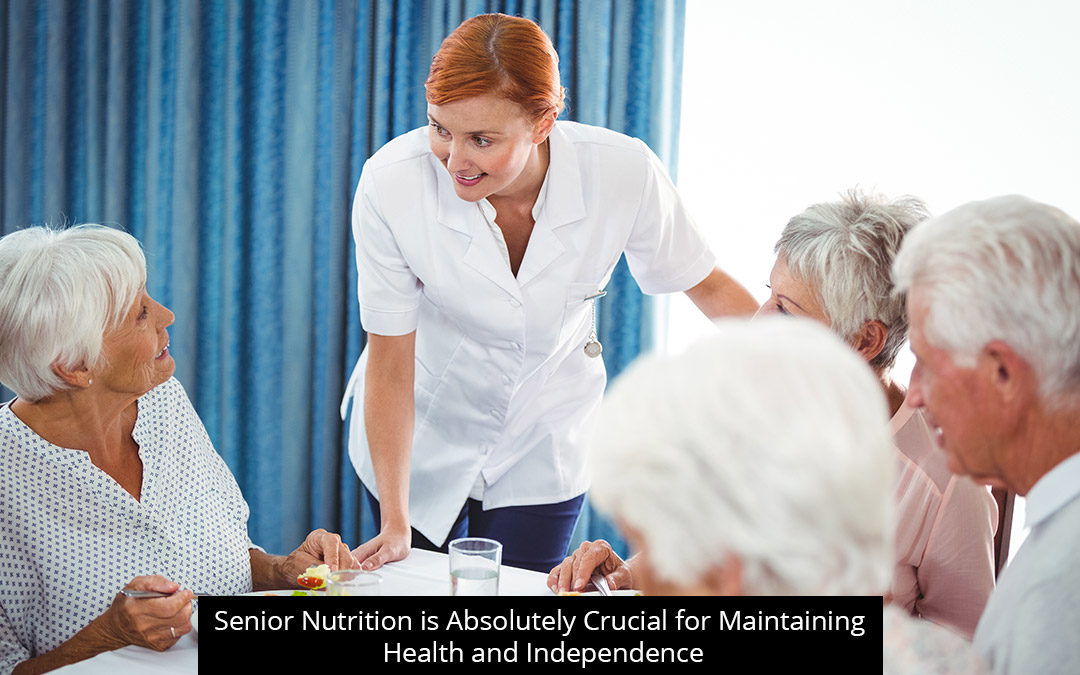Maintaining a nutritious and balanced diet is important at any age, but it becomes exceedingly critical the older we get. Getting a healthy daily dosage of essential vitamins and minerals is necessary to help prevent illness and injury and to get sufficient energy to tackle everyday tasks and routines.
Why Is Nutrition So Important For Seniors?
As we age, the body and mind go through various changes that can make it more difficult to maintain health and wellbeing. Examples of these changes in older adults include:
- Slower metabolism
- Weakened senses
- Higher risk of chronic health issues
Slower Metabolism
The natural metabolic processes in the body begin to slow down with age making it more difficult to burn calories before they get stored as fat. After the age of 30 your metabolic rate is on the path of gradual decline as is your muscle mass. The decline begins slowly and tends to pick up speed with each passing decade.
The result? Adults over the age of 60 should be extremely conscious of the foods they consume to avoid excess weight gain, increased risk of illness, and loss of mobility. This involves catering senior diets to foods lower in calories and richer in nutrients.
Weakened Senses
Seniors often report a declining sense of taste and smell, and a decreasing interest in food in general as they get older. When this deterioration in taste buds is combined with other factors like reduced mobility, lack of desire to cook for oneself, and loss of appetite, it can be challenging to maintain a healthy diet.
Higher Risk Of Chronic Health Issues
The culmination of a variety of factors contribute to seniors being at a higher risk for a range of ongoing health concerns. Nutrition and exercise are at the forefront and are interconnected. Regular exercise is key to preserving mobility and an independent lifestyle, but is not possible without the necessary fuel to allow it.
Nutrients and protein are essential for providing the body’s cells with the energy needed to carry out their designated functions. On the other hand, processed foods high in fat and sugar serve the opposite effect of loading the body up with empty calories that are difficult to convert to useable energy.
Essential Nutrients For Seniors
Before establishing and following a nutritious diet, it is first necessary to determine which nutrients are the most important to target. This list may vary depending on other health factors, but generally seniors should be focusing on:
- Vitamin A
- Vitamin D
- Calcium
- Fibre
- Protein
- Calorie intake
- Hydration
- Avoiding processed foods
Vitamin A
Vitamin A is essential to help prevent vision loss and compromised immune function. It also helps preserve health heart, lung, and kidney function.
Good sources of Vitamin A include:
- Leafy greens – spinach, lettuce, kale, broccoli
- Yellow and orange fruit and veg high in carotenoids – carrots, squash, cantaloupe, apricots, mangoes
- Tuna, salmon, beef liver
- Dairy products
Vitamin D
Vitamin D deficiency is a widespread problem for seniors which can result in weak and brittle bones, depression, and other health issues. Sunlight is the most readily abundant source of vitamin D, so seniors that don’t get outside very often may be lacking in the nutrient.
Food sources that contain vitamin D include:
- Oily fish – salmon, mackerel, sardines, herring
- Egg yolks
- Red meat and liver
- Fortified foods and dietary supplements
Calcium
Calcium is also required for strong bones and works together with vitamin D to help preserve bone strength.
Calcium can be found in:
- Dairy products
- Leafy greens
- Soy and tofu
- Fortified foods and beverages
Fibre
Fibre is essential not only for aiding in digestion and regularity, but it can also help reduce cholesterol and stabilize blood sugar levels.
Good sources of fibre include:
- Whole wheat bread, brown rice, quinoa
- Apples, berries, bananas, pears
- Beans, nuts, chickpeas, oatmeal
Protein
As muscle mass continues to diminish with age it is critical to get sufficient levels of protein to maintain strength, balance, and mobility. It is also needed for healthy immune resistance, and cell growth and repair.
Protein can be obtained from:
- Fish and seafood
- Poultry
- Dairy products, eggs, soy, and tofu
- Beans, nuts, and seeds
- Beef in moderate amounts
Calorie Intake
As we get older, our bodies can no longer easily metabolize the same amount of calories, but still require the same amount of nutrients. Monitoring calorie intake and avoiding foods high in empty calories helps to maintain a healthy diet.
Hydration
Along with other senses, sense of thirst also tends to weaken with age, so it is necessary to drink plenty of water throughout the day even if you are not overly thirsty.
Avoid Processed Foods
The foods you don’t eat are just as important as the foods you do eat. Target foods rich in vitamins, minerals, protein, and fibre while avoiding processed foods with excess sugar and fat. Yes, processed foods are quick and easy, but they also come with a higher risk for a wide range of health problems.



